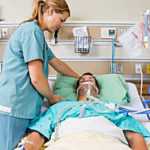Abortion: Ending the pregnancy either by medicine or surgery before the baby is born.
(اسÙاط٠ØÙ
Ù)
Allergy: Reaction to certain things such as some kinds of food, or pollen, itch, rash or breathing problem. (اÙرجÛØتÛزØسÛ)
Amnesia: Memory loss. Not being able to remember.
(بھÙÙÙÛ Ú©Û Ø¨ÛÙ
ارÛ)
Ambulatory Care: Medical services provided on an outpatient (non-hospitalized) basis. Services may include diagnosis, treatment, surgery, and rehabilitation.
(اÛÙ
بÛÙÛÙ¹Ø±Û Ø¯ÛÚ©Ú¾ بھاÙ)
Aspirin: A medicine commonly used to relieve pain and reduce inflammation; used at the first signs of heart attack to prevent blood clots. (درد کشا Ú¯ÙÙÛ)
Biopsy: A small sample of tissue that is usually surgically removed so it can be tested for diseases.
(Ù¹ÛسÛÙ Ûا ÙسÛج Ú©Û Ù
شاÛØ¯Û Ø³Û Ù
رض کا Ù¾ØªÛ ÙگاÙØ§Ø ØÛÙÛ ØªØ´Ø®Ûص)
CVD: Cardiovascular disease, i.e., diseases of the heart (cardiac muscle) or blood vessels.
(ÙÙØ¨Û Ø§Ù
راض)
Catheter: Also called a urinary catheter, it is soft tube that is inserted into the bladder to allow urine to flow out. It is sometime put in before or after surgery, to get a urine sample to test for infection.
(جسÙ
Ø³Û Ø³Ûا٠ÙکاÙÙÛ Ú©Û ÙÙÚ©Û)
Diarrhoea: Frequent, very runny bowel movements. (دست)
Laxatives: A group of medicines which can help relieve constipation by promoting a bowel movement. (Ùبض کشا دÙائÛÚº)
Hypertension: High blood pressure. (بÙÙد Ùشار٠خÙÙ)
Hypotension: Low blood pressure. (بÙÚ Ù¾Ø±Ûشر Ú©Ù ÛÙÙا)
ICU: Intensive care unit-where very seriously ill patients are looked after in a hospital.
(ÛÙÙÙ¹ Ø¨Ø±Ø§Ø¦Û Ø§ÙتÛØ§Ø¦Û ÙÚ¯Ûداشت)
Morbidity: The state of being diseased; ratio of persons who are diseased to those who are well in a given community. (ØاÙت٠٠رض)
MMR: measles, mumps and rubella “ refers to the vaccination given for all three diseases.
(ÚÚ¾ÙÙ¹Û Ø¨ÚÙÚº Ú©Ù Ø¯Û Ú¯Ø¦Û Ø§ÛÚ© Ù
Ø´ØªØ±Ú©Û ÙÛÚ©Ø³Û ÙÛØ´Ù)
Mortality: The number of deaths occurring per the number of units in the population at risk for the occurrence (e.g., per 100,000 population); death rate.
(Ù
ÙØªØ Ø§Ù
Ùات Ú©Û Ø´Ø±Ø)
Pneumonia: Inflammation of the lungs caused by an infection. Can be caused by a variety of organisms, including bacteria, viruses, and fungi.
(Ù¾ÛÙ¾Ú¾ÚÙÚº Ú©Û Ø³ÙزشØÙÙ
ÙÙÛا)
Primary Care: Basic or general healthcare traditionally provided by doctors trained in: family practice, pediatrics, internal medicine, and occasionally gynecology. (Ø§Ø¨ØªØ¯Ø§Ø¦Û Ø¹Ùاج)
MRI (magnetic resonance imaging) scan: A painless test that uses a strong magnetic field to get clear pictures of specific body parts, such as the brain or stomach. The patient lies in a special machine like a tunnel.
(جسÙ
Ú©Û Ù
ÙÙاطÛØ³Û Ù
صÙØ±Û Ø¨Ø±Ø§Ø¦ÛتشخÛص)
Cardiologist: Heart specialist.
(Ø¯Ù Ú©Û Ø§Ù
راض کا Úاکٹر)
Dermatologist: Skin specialist.
(جÙØ¯Û Ø§Ù
راض کا Ù
عاÙج)
Gynaecologist: Doctor specializing in disorders occurring among Women.
(Ø®ÙاتÛÙ Ú©Û Ø§Ù
راض کا Úاکٹر)
Haemotologist: Specialist related to disorders related with blood.
(Ø®ÙÙ Ø³Û Ù
تعÙ٠اÙ
راض کا Ù
عاÙج)
Hetpatologist: Specialist related with Liver disorder.
(جگر (Ú©ÙÛجÛ) Ø³Û Ù
تعÙ٠اÙ
راض کا Ù
عاÙج)
Oncologist: Cancer specialist.
(Ú©ÛÙسر Ûا سرطا٠کا Ù
عاÙج)
Pulmonologist: Specialist related with lung disorders.
(Ù¾Ú¾ÛÙ¾ÚÙÚº Ø³Û Ù
تعÙ٠اÙ
راض کا Ù
عاÙج)
Pathologist: Specialist identifying disorders through cells and tissues.
(سÛÙس(Ø®ÙÛات)Ûا ÙسÛجÙÚº(Ù¹ÛسÛÙز) Ú©Û Ù
طاÙØ¹Û Ø³Û Ø§Ù
راض Ú©Ù Ù¾ÛÚاÙÙÛ ÙاÙا Ù
اÛر)
Paediatric: Child specialist.
(بÚÙÚº Ú©Û Ø§Ù
راض کا Ù
اÛر)
Urologist: Mahir e Ilmul Baul, Peshab ki naliyon ka mualij
(Ù
اÛر٠عÙÙ
اÙبÙÙØ Ù¾Ûشاب Ú©Û ÙاÙÛÙÚº کا Ù
عاÙج)


COMMENTS